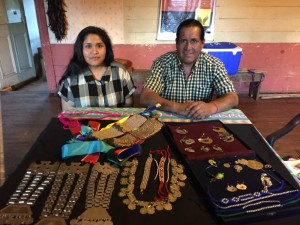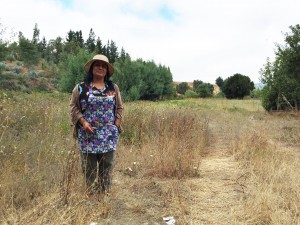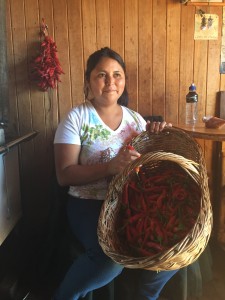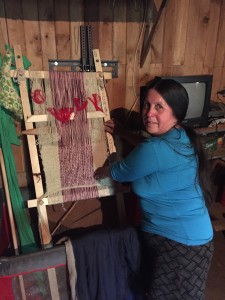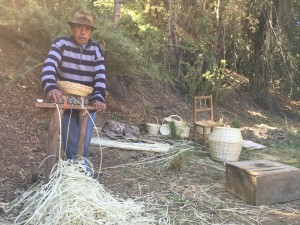Our beneficiaries
The participants involved in our project are Mapuche people, who are active in the production and sale of handmade products and interested in improving their working condition and their efficiency, according to their traditional values. Our beneficiaries are based in the communities around Lumaco. They are mostly working in traditional Mapuche fields: agriculture, furniture, textile, silversmithing, basketwork, typical spice production. There will be 17 beneficiaries in the pilot phase of the Mapuche Chapter project. Here we share five of their stories to give you the opportunity to discover the faces and the issues, which affect this small indigenous communities.
Mr Eugenio Laviñir has 15-years experience working as a silversmith. His activity is very much appreciated in his community where, besides selling his handicrafts, he occasionally gives workshops on his traditional techniques. In this way he contributes to the preservation of the material culture of the Mapuche. His artisanal activity represents his only source of income, though it has been recently hampered by increasing costs of materials and frequent electricity and water shortages.
: Main issues: Material costs, electricity and water shortages.
:: Requested tool: Moulds.
::: The Mapuche Chapter will increase his productivity and his working conditions thanks to new and more technologically advanced tools bought through our microcredit fund and the provision of a reliable energy source.
Ms Margarita Painiqueo has a greenhouse where she cultivates native plants, potatoes and maize, for both subsistence and trade. In addition to these plots, she produces medicinal herbs which she provides to the shamans of the community. The lack of water and the electricity shortages represent a fundamental issue for her activity, which is why she is interested in starting to use solar energy to increase and improve her crops.
: Main issues: electricity shortages
:: Requested tool: Motor pump, Nylon, Nails, Staple, wire rolls
::: The Mapuche Chapter is an opportunity to meet the existing energy requirements for her business requirements and permit future growth and expansion of her activities including extending her growing season into the winter.
Evelyn Maliqueo produces and sells traditional Mapuche foods and spices. She is specialized in the production of the culinary spice Merkén. Evelyn works alone, having acquired her skills from her mother. In the future she would like to build a greenhouse in order to increase her production and to
diversify into the cultivation of other spices. Water and electricity issues are the main challenges for her job, which have a negative impact on her production, especially in the winter.
: Main issues: electricity and water shortage
:: Requested tools: Motor pump and Polythene.
::: The Mapuche Chapter is her opportunity to build the workspace she desires, a greenhouse and to alleviate the main water and electricity issues limiting her production.
Sebastiana Reiman is a weaver who lives with other seven people. She weaves in the traditional Mapuche way, mainly handbags, and sells them within the Community. Sebastiana works alone but she would like to employ a team to increase production and share her knowledge. Her husband sells eggs, but her job represents the main source of income for the whole family. Sebastiana desires to take a course to improve her knowledge in the textile field, including how to use more advanced sewing machine. She is not able to make use of such machines at the moment owing to the existing electricity supply issues.
: Main issues: electricity shortages
:: Requested tools: Overlock machine, sheet iron
::: The Mapuche Chapter is her opportunity to improve her working conditions and the quantity and quality of her products.
Jorge Maliqueo, the father of two sons, produces handmade wooden furniture including chairs, table. Jorge and his wife, sometimes helped by sons, produce and trade most of their products within the Community, but they have developed a small network of external in the nearby villages of Temuco and Angol. Jorge’s business is not affected by electricity shortages, but he finds that the cost is too high. He is interested in solar energy to reduce his overheads, and investment in tools to increase his furniture production capacity. Woodcraft is not Jorge’s only source of income: he also sells organic Merkèn and carries out some gardening activities. He would like to extend ad better equip his workspace, and hire extra people to help him in order to grow all areas of his business activities.
: Main issues: electricity cost
:: Requested tools: Sawing bench, electric saw
::: The Mapuche Chapter helps to modernize his production using more technological machines, while also offering the means of reducing his long term energy costs.
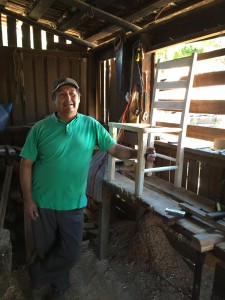
Nolberto Nahuel is a basketry producer and seller, and the father of grown up two sons who no longer live with him. His knowledge of basketry was passed on to him from his grandfather and this job represents his only source of income. Currently, Nolberto produces 3-4 baskets per week and sells 15-20 baskets per month, mostly in Lumaco and Traiguen. He desires to produce and sell more and to improve the efficiency in production. In addition, Nolberto needs an indoor workspace to be able to work during winter and lighting to extend his working day.
: Main issues: lack of workspace with electricity and lighting
:: Requested tools: Zinc plates, sheets for lining and bags of cement.
::: The Mapuche Chapter improves his working conditions and increases his production potential.
